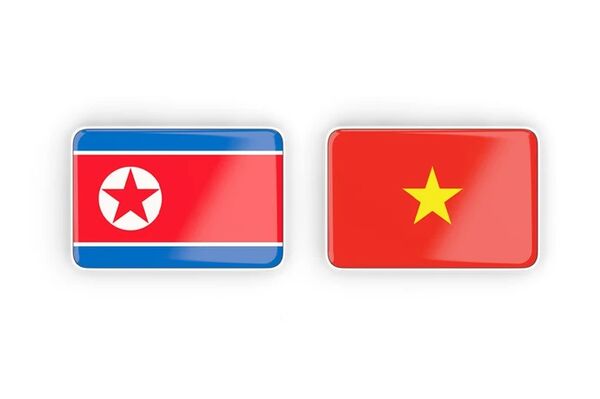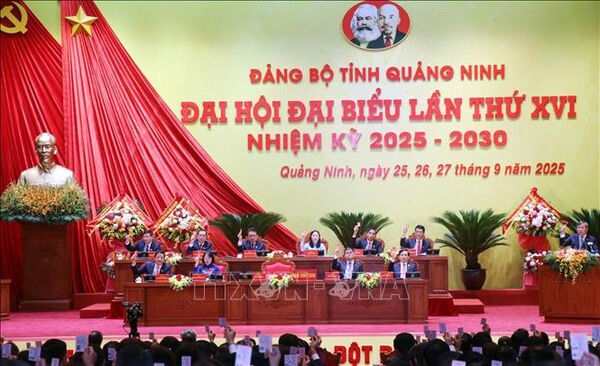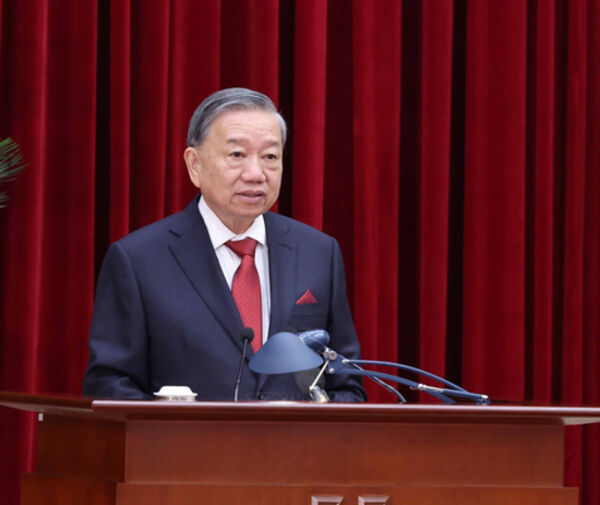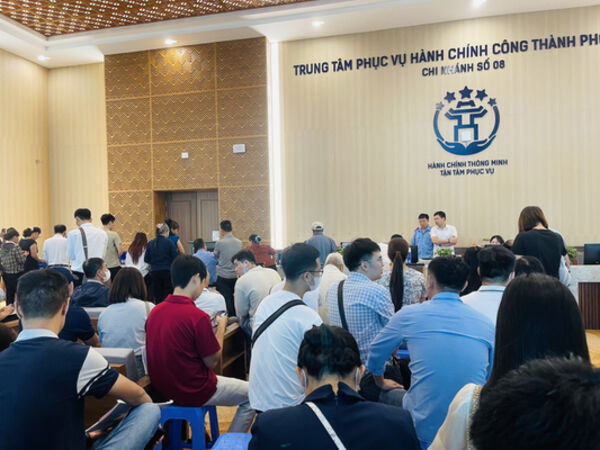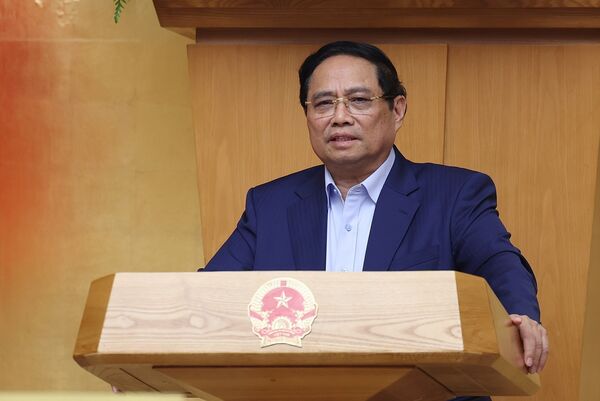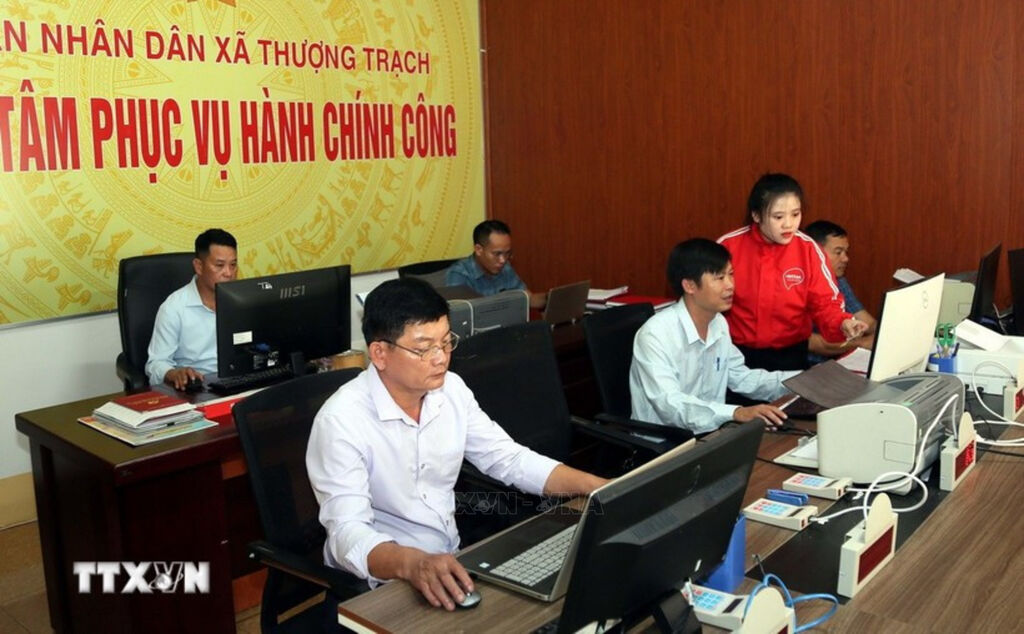 |
| Officials of Thuong Trach commune's Public Administration Centre in Quang Tri province make concerted efforts to promote digital transformation and build an e-administration system. (Photo: VNA) |
Hanoi (VNA) – The Politburo’s Resolution No.57-NQ/TW on breakthroughs in science – technology, innovation and national digital transformation, coupled with the national transformation programme are seen as two pillars propelling Vietnam into an era of new development where knowledge, data, and technology become the foundations of sustainable development.
National Digital Transformation Day, observed on October 10, marks a moment to look back on achievements while continuing to take even stronger actions to build a digital and prosperous nation, contributing to its industrialisation, modernisation, and international integration.
From policy to action
In 2020, the Government issued Decision No.749/QD-TTg approving the national digital transformation programme until 2025 with a vision to 2030 with three pillars of digital government, digital economy, and digital society. Resolution 57, issued in late 2024, creates a legal framework to encourage innovation, research, and technology adoption in businesses. It defines digital transformation as a strategic breakthrough and targets digital economy contributions of 30% of the GDP by 2030 and 50% by 2045.
Multiple programmes, plans, and policies are being developed and put into practice, accelerating technology integration across all sectors of life, laying the groundwork for the robust development of the digital government, digital economy, and digital society.
According to Deputy Director of the National Authority of Digital Transformation under the Ministry of Science and Technology (MST) Le Anh Tuan, digital transformation, together with science – technology, innovation, and especially AI have become a powerful driver of the future. Last year, Vietnam achieved notable results, with its e-government ranking rose by 15 places, full-process online records reaching nearly 40%, IT industry revenues hitting 2.77 quadrillion VND (105.12 billion USD), up 24%, and hardware-electronics exports rising 29%.
He said digital infrastructure has expanded dramatically. Over 99% of villages and hamlets now have broadband mobile networks, mobile internet speeds have reached 146.64 Mbps, ranking twentieth globally, and 5G coverage stands at 26%. Notably, 21.8 million digital certificates have been issued, along with 64 million VNeID accounts and 17.5 million chip-embedded citizen identity cards, providing the foundation for safe and convenient electronic transactions.
All of the ministries, sectors, and localities have issued and implemented their digital transformation plan in accordance with Resolution No.57-NQ/TW.
The draft Law on Digital Transformation compiled by the MST features new provisions, helping remove bottlenecks and promote the digital transformation progress.
Tran Quoc Tuan, an official from the National Authority of Digital Transformation, said that the draft institutionalises the view that digital, technological, and public digital infrastructure are national strategic assets. The State will prioritise investment while mobilising resources to develop modern, secure, sustainable, and green digital infrastructure, especially for projects generating high socio-economic value.
The law also provides tax incentives and financial support for enterprises, particularly small and medium-size enterprises, cooperatives, and business households undertaking digital transformation. Spending on digital adoption will be treated as deductible expenses for corporate income tax, easing financial burdens and fostering innovation.
At the same time, the State will also prioritise “Make in Vietnam” digital products and services, creating opportunities for domestic tech firms to master core technologies.
The draft highlights cybersecurity, data protection, and the responsibility of digital platforms in settling harmful content and safeguarding national digital sovereignty.
Regarding data, the Ministry of Public Security has been assigned to lead and coordinate with the MST and other ministries, sectors, and localities, excluding the Ministry of National Defence and the Government Cipher Committee, to conduct a comprehensive review and assessment of the current state of construction, exploitation, and use of national databases and specialised sectoral data.
 |
| As many as 64 million VNeID accounts have been issued. (Photo: VNA) |
Based on this assessment, competent sides will develop and issue their own data and digital transformation strategies by September 2025. The strategies aim to standardise, update, and complete the national data system, ensuring compliance with the National Digital Architecture Framework, National Data Architecture, Data Governance Framework, and Common Data Dictionary, striving for completion within 2025.
Priority will be given to standardising 11 critical national and sectoral databases, including those on land, finance, education, civil status, healthcare, goods, construction, asset control, administrative violations, agriculture, and social welfare, key resources to streamline public administration and serve citizens and businesses more effectively.
Comprehensive digital transformation
The National Digital Transformation Day highlights the need for digital transformation to reach out to every citizen, every community, and every field of life and production, serving as a catalyst to improve productivity, innovation, and living standards, while asserting Vietnam’s position amidst deep global integration.
On the occasion, the MST developed an identity package for the day, including logo, slogan, poster, banner, and backdrop to be used across commune information channels, agency headquarters, schools, and residential areas.
In response to the day, various practical activities have been organised. Hanoi launched the digital learning movement on October 9 to raise public awareness of digital transformation’s significance to innovation and development.
In the southern most province of Ca Mau, the National Digitral Transformation Day was held, spotlighting faster and smarter digital transformation while the provincial digital transformation association was introduced.
Meanwhile, Tuyen Quang province launched an intensive communications campaign on digital transformation to promote digital literacy, non-cash payments, online public services, and the use of digital platforms in daily life and production./.


